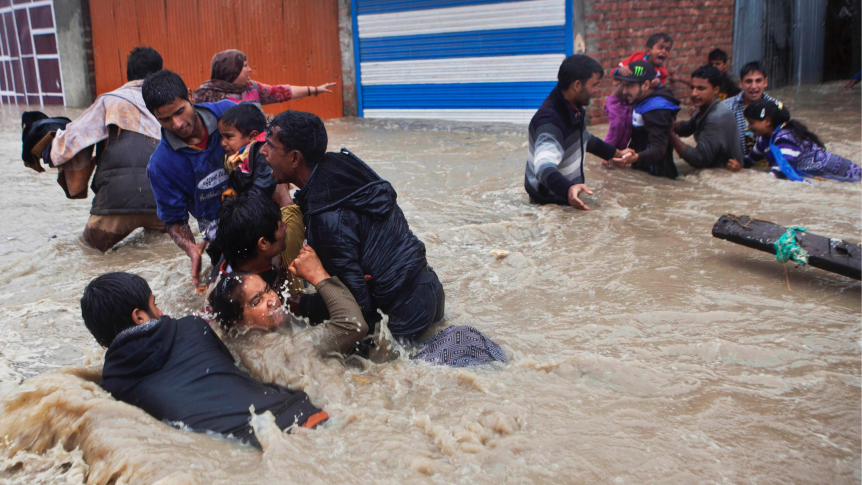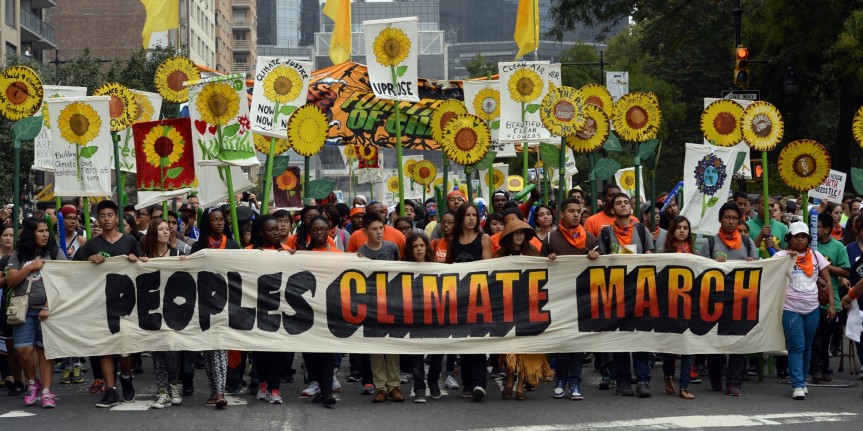Along with thousands of others, I’m joining the global wave of citizen actions to Break Free from Fossil Fuels taking place the first two weeks of May. The goal: to raise public awareness that we’re in a climate emergency. Business as usual is not going to steer us away from the precipice. We need to keep fossil fuels in the ground.

At COP21, the world’s nations agreed to target a global temperature rise of 1.5º-2.0º this century. How much carbon can we still burn if we’re to have a decent chance of meeting that target? The answer is staggering. The world’s carbon budget is just 16% of the fossil fuel reserves already known to be in the ground, if we are to have just a one-third chance of staying below 1.5º.
At the current rate of emissions, we’ll burn through this carbon budget of 473 Gigatons within the next two decades. When you consider that previous energy transitions (such as the rise of coal or electricity) have taken 50-100 years to occur, the odds of staying within the COP21 targets seem almost insurmountable. But we still have a fighting chance to avert disaster. How?
Firstly, the benchmarks of history don’t have to determine our future. A new study has documented many recent energy transitions that have occurred far more quickly. It took just eleven years for France to transition to nuclear-powered electricity generation and for Ontario to get rid of coal as a major source of its electricity.
What’s more, the technology is already here. Stanford professor Mark Jacobson has mapped out detailed plans showing how every state in the U.S., along with 139 countries worldwide, can shift to 100% renewable energy by 2050, while creating more jobs, improving health, and costing less.
And yet, in spite of it all, fossil fuel companies still spend millions of dollars a day exploring for ever more oil and gas reserves that can never be burned if we’re to maintain our civilization. That’s because their overriding concern is to keep their stock prices high, which are based on the valuation of their proven reserves. To please their shareholders, these companies are using our sky like a sewer – poisoning the commons that we’ve inherited and that we temporarily hold in trust for untold future generations. How can this be stopped?

Putting a price on carbon is an important way to shift the momentum in the opposite direction. Citizens’ Climate Lobby advocates a sensible plan to tax carbon as it’s collected at the earliest point of entry (oil well, mine or port) and rebate the revenues to households equally. They estimate that if the price is set correctly it would lead within 20 years to a 50% reduction in CO2 emissions from 1990 levels.
The problem is, we’re past the point where this plan could save us. The oil companies (many of which already support carbon pricing) would lobby to keep the price low, and the world would still be emitting far too much carbon. It’s a great strategy for one of those historical decades-long transitions, but not enough when we’re facing a climate emergency, a dire threat to the very future of our civilization.
There is a way, though, that could help us avoid this calamity, as an important part of the global climate mobilization that needs to take place. It’s called the Atmospheric Trust. It’s an idea that’s been bounced around by leading thinkers in the environmental movement for over 15 years. It hasn’t gone anywhere yet. But I believe its time has come.
The Atmospheric Trust is based on the fundamental and irrefutable notion that the earth’s atmosphere is part of the commons. It belongs to all of us. There is a strong legal basis for this: a well-established public trust doctrine which holds that certain natural resources should be held in trust to serve the public good. This has been confirmed in recent court cases in both Europe and the United States.
Corporations have no right to impair our common property unless we, the people of the world and beneficiaries of the commons, choose to transfer that right to them. Given that 473 Gigatons of carbon is the maximum that can be added to the atmosphere before compromising our civilization’s future, that right must be capped at that level.

Once that cap is established, the right to mine the 473 Gigatons still available in the ground should gradually be auctioned off to the highest bidders. Those rights could be traded in an after-market. Given the dynamics of supply and demand, as the available rights shrink, their price would dramatically increase over time.
There is something profoundly distasteful about selling off rights to pollute nature to the highest bidder. The natural world is our sacred heritage, beyond price. Any attempt to put a price tag on nature risks subverting the sacred to the global monetary system. I’ve written elsewhere about the dangers of this path.
In this case, however, the fossil fuel corporations are already using the natural commons as their dumping ground – for free. Not only that, governments are subsidizing them to do so to the tune of $450 billion a year. The creation of an Atmospheric Trust would put an end to that. It would fix a final cap on the amount of carbon pollution compatible with our continued civilization. And rather than allowing corporations to profit from freely polluting our air, it would charge them a hefty fee for the privilege.
Unlike the problems with current cap-and-trade systems, there would be no downside to trading these rights to pollute. With the amount to be mined already fixed, there would be no possibility to create false credits, as happens in current systems that merely cap emissions of a particular company or industry.
The Atmospheric Trust would be a gigantic step towards asserting global climate justice, if the several trillion dollars in revenues received annually were distributed fairly. One proposal suggests granting half the revenues equally to every global citizen (which would significantly impact the lives of those who need income the most). The other half could go directly to the communities already being battered by the devastating effects of climate chaos, as well as those living in the sacrifice zones that continue to suffer the devastation of the fossil fuel companies’ extractive rampage.

At this point, perhaps you’re shrugging your shoulders and thinking: “Great idea, but simply not feasible in the real world.” There are certainly daunting obstacles. Much of the fossil fuel is below the ground of nations such as Saudi Arabia or Russia, which are not likely to cooperate with an Atmospheric Trust. And of course, the Western fossil fuel companies can be relied on to continue their decades-long campaign of dirty tricks to keep such an idea off the table.
But even these obstacles can be overcome. Prominent economist William Nordhaus has floated the idea of a “Climate Club” consisting of the world’s major economies. If the G7 countries along with China came up with a detailed, enforceable program, the rest of the world would have no choice but to go along with it. And concerted citizen actions, such as the fight to overturn the Keystone XL Pipeline, have shown that the fossil fuel companies’ stranglehold over the public interest is beginning to unravel.
Still sounds far-fetched? So did the idea of an African-American President being elected… until he was. And precious few people thought they would ever live to see the day when same-sex marriage was legalized in the U.S. – until it happened. In the words of the thought-leaders proposing the Atmospheric Trust in Science magazine in 2008, it “may seem visionary or idealistic today, but that could become realistic once we reach a tipping point that opens a window of opportunity for embracing major changes.”
We’re reaching that tipping point now. As our climate emergency produces an inexorable onslaught of cataclysmic floods, fires and droughts, as refugee crises from regions stricken by climate chaos threaten to overwhelm the current world order, the establishment of an Atmospheric Trust will begin to take its place in mainstream discourse, just as carbon pricing is already doing.
Imagine the transformed world that would arise from an Atmospheric Trust. No more extreme extraction such as fracking, tar sands, and offshore drilling (no longer economically feasible.) The power of the fossil fuel companies permanently extinguished as their stocks (currently based on unburnable reserves) crashed. Climate justice finally served as trillions of dollars are transferred from the extractive industries’ profits to the communities that have suffered (and continue to suffer) the most. Massive investment in renewable energy. And with a fixed cap on the amount of carbon to be burned, humanity could breathe a collective sigh of relief for the future of our civilization.
Each one of us could have a part to play in creating that future of hope. If you like the idea of an Atmospheric Trust, you can sign an open letter to the 20 countries most vulnerable to the effects of climate change, asking them to get the ball rolling.
Which brings us back to the actions taking placing right now across the world to Break Free from Fossil Fuels. There’s a direct link between mass citizen actions and the shaping of global policies that could save our civilization from the pillaging of the fossil fuel industry. When Christiana Figueres, head of the COP21 climate talks, gave her closing speech to the summit, she told how citizen power forced politicians to accept a new reality. “When in 2014,” she said, “hundreds of thousands of people marched in the streets of New York, it was then that we knew that we had the power of the people on our side.”

It’s going to take a massive, worldwide wave of citizen action, such as the world has never seen before, to stay ahead of the climate catastrophe beckoning. Creating a worldwide Atmospheric Trust is a project of a different magnitude than the unenforceable agreements of COP21. None of us can predict whether the changes we need will come in time. But every one of us has the option to choose to be part of the movement trying to protect humanity from the global suicide pact to which our governments are currently committed.

Reblogged this on vequinox.
LikeLike